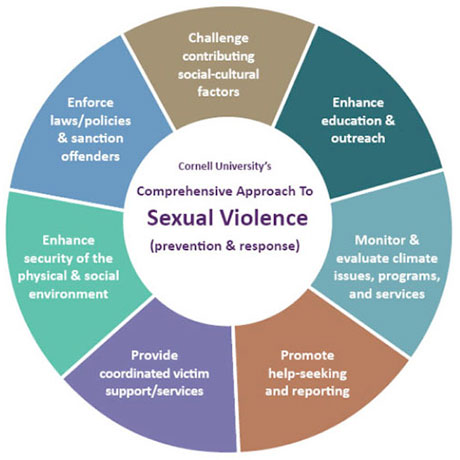Cornell combats sexual violence with strategic approach
By Nancy Doolittle
A number of activities and events will take place on campus and locally to support Sexual Assault Awareness month in April, furthering the university’s approach to preventing and responding to sexual violence. Several student organizations are sponsoring events during Sexual Assault Awareness Week, April 13-17, including a panel discussion and seminar on bystander intervention. Other on-campus activities in April include participation in a national student survey and the initiation of a policy review.
Cornell to revise Policy 6.4
Cornell University’s Policy 6.4, which addresses prohibited discrimination, protected-status harassment, sexual harassment, and sexual assault and violence, was last updated in 2013 to maintain compliance with current state and federal laws. This spring, university governance groups and others are being asked to provide feedback on improvements to Policy 6.4. This will inform policy revisions over the summer, after which the campus community will be asked for input.
These activities aim to build awareness of sexual assault/violence, harassment and stalking; advance a positive sexual climate in the Cornell community; and foster a campus culture that does not tolerate sexual violence of any kind.
“We all share the responsibility for creating a caring campus culture,” said Susan Murphy, vice president for student and academic services. “My hope is that Sexual Assault Awareness month will put a spotlight on the work the university is doing through the Council on Sexual Violence Prevention and its partners to better prevent and respond to sexual assaults, help our students create a healthy sexual culture on campus, and create dialogue around such proactive measures as the safe use of alcohol and the importance of intervening through bystander activities.”
Since its formation in 2013, the university’s Council on Sexual Violence Prevention (CSVP), co-chaired by Murphy and Mary Opperman, vice president for human resources and safety services, has taken a strategic, proactive approach to prevent and respond to sexual violence (see chart).
This comprehensive approach:

Challenges social and cultural factors
Preventing sexual violence depends on addressing cultural and social factors that support discrimination, harassment or bias, while promoting a culture of respect and civility, personal accountability and caring, and CSVP members participated in a presentation about ways to enhance further the campus climate.
An on-campus screening of the documentary film “The Hunting Ground” will be shown April 16, 5 to 8 p.m., in 230 Anabel Taylor Hall. Ithaca’s Advocacy Center also is sponsoring a screening of the film, which will be followed by a talkback session, April 15 at Cinemapolis.
Enhances education and outreach
Ongoing student programs focus on help-seeking and bystander intervention; faculty and staff programs explain reporting obligations. Programs included orientation sessions for incoming students; a workshop for all student-athletes; an updated online course, “Building a Culture of Respect at Cornell: Responding to Sexual Violence, Harassment and Discrimination,” for faculty and staff; and a 90-minute program for new Greek members. Programs on alcohol abuse, sexual violence and bystander intervention are being delivered to Greek chapters this spring.
A White Ribbon Campaign will be held April 20, and the annual “Take Back the Night” march will be April 24. A symposium focused on involving faculty in sexual violence prevention on college campuses will be held at the ILR Conference Center April 28.
Monitors and evaluates climate issues, programs and services
All students will be invited via email April 13 to complete the Association of American Universities Campus Climate Survey on Sexual Assault and Sexual Misconduct to further the university’s understanding of sexual violence in a national context and to better understand, prevent and respond to issues related to campus sexual violence.
Promotes help-seeking and reporting
A “How to Help” resource card sent to staff and faculty in January is a reference for what to do when a sexual assault is reported.
Provides coordinated services and victim support
The University Victim Advocate and the Ombudsman’s Office provide confidential support to victims and survivors. Gannett Health Services provides integrated confidential medical and counseling services to survivors.
The SHARE website (Sexual Harassment and Assault – Response and Education) provides comprehensive sexual violence education, reporting and support resources for the Cornell community.
Enhances the security of the physical and social environment
Police Chief Kathy Zoner sends a message on a variety of safety topics to the campus community weekly. Gannett Health Services and the Department of Athletics and Physical Education are collaborating with varsity student athletes on a pilot program to develop student-driven interventions that may reduce health risks to safety, including alcohol abuse and sexual violence, with the goal of changing norms and creating a positive social culture for the team.
Enforces laws and policies
The university is considering increasing staffing to help resolve complaints of sexual misconduct, sexual harassment and gender-related violence on campus.
Media Contact
Get Cornell news delivered right to your inbox.
Subscribe